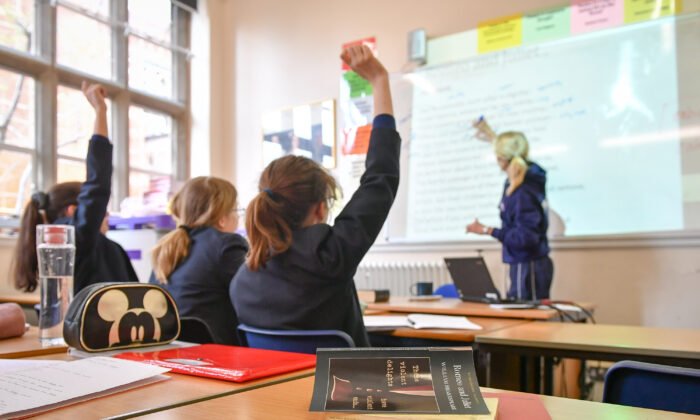Record High Levels of School Suspensions and Exclusions
The record-high figures come amid warnings that schools are facing an increase in behavioral and mental health issues following the COVID-19 lockdowns.
The number of suspensions and permanent exclusions in England have hit record highs, with suspensions rising by more than a third in one year, government data shows.
Statistics published on Thursday show that in the school year 2022/2023, there were 786,961 suspensions, up from 578,280 the year before and an increase of 36 percent.
Permanent exclusions—when a pupil is expelled and no longer allowed to return to that school—saw an even steeper increase, rising 44 percent from 6,495 in 2021/2022 to 9,376 last year.
In line with previous years, “persistent disruptive behavior” was the top reasons given for the action, accounting for 48 percent of suspensions—where a pupil is excluded from school for a fixed period of time—and 39 percent of exclusions.
Verbal abuse or threatening behavior against an adult (16 percent) was the second most common reason for suspensions, followed by physical assault against a pupil (13 percent). For permanent exclusions, physical assault against a pupil was the second most frequent reason (15 percent), followed by verbal abuse or threatening behavior against an adult (12 percent).
Education Minister Stephen Morgan said the figures were a “wake-up call about the problems that have grown in our schools in recent years.”
Mr. Morgan said the government was “determined to get to grips with the causes of exclusions,” adding it had already committed to more mental health professionals in schools and other measures, including early intervention in mainstream schools for children with special needs.
Post-Lockdown Behavioral Issues
The rise in exclusions and suspensions comes amid warnings that schools are facing an increase in behavioral issues following the COVID-19 lockdowns.
A report written by academics and funded by the Nuffield Foundation, an education think tank, in April said that not only did lockdown-induced school closures caused significant and long-lasting damage to learning, but also deprived children of in-person support and social interaction.
The report said that teachers had reported “greater behavior problems in classrooms since the pandemic,” the think tank adding that by its estimates, there has been a “significant decline in the socio-emotional skills for successive Covid cohorts.”
Last year, the National Governance Association (NGA) said that “aftershocks” from the lockdowns continued to affect schools. School leaders said that behavioral challenges had seen a sharp increase, with 68 percent of respondents to an NGA survey noting an increase in worsening student behavior over the previous 12 months. Governing boards also noted a rise in concerns over mental health and self-harming among pupils.
Ghost Children
Commenting on Thursday’s government release, Beth Prescott, the education lead at the Centre for Social Justice (CSJ) think tank, said the figures were “truly shocking.”
Ms. Prescott said, “Combined with the crisis in school absence, with so-called ‘ghost children’ at near record levels and 1 in 5 kids persistently absent, there is a pressing and immediate emergency unfolding across our schools.”
“CSJ research has uncovered that the impact of the pandemic, the cost-of-living crisis, high levels of mental health in children and a steady increase in the level of SEND over the last decade are all contributing to a tidal wave of challenges hitting children, families and schools. This has resulted in an increasing number of children struggling to fully engage with their education, with potentially catastrophic and lifelong consequences for their lives, for wider society and for the economy,” she continued.
Government figures released in March showed that the number of unauthorised absences from schools in England increased last year and is nearly double the rate from before the lockdowns, which saw schools shut down and learning moved online.
The issue of “ghost children”—pupils who are not regularly attending school or who are not enrolled at a school—has become an increasing concern since the COVID-19 pandemic.
Ms. Sergeant said that there were two kinds of children that schools were struggling to get back into the classroom: those that are too anxious and those that are too angry.
Disadvantaged Children
The recent government figures come after the Education Policy Institute (EPI) released a report saying that the pandemic had accelerated the trend of the worsening attainment gap between underprivileged children and their peers.
The report said that between 2019—the year before the COVID-19 lockdowns—and 2023, “we have seen the disadvantage gap widen in early years, primary schools and secondary schools.”
The EPI said that although the examinations and grade distributions largely returned to normal in 2023, “the impact of the pandemic is not yet over” and “educational inequalities look very different from how they did in 2019.”
PA Media contributed to this report.





